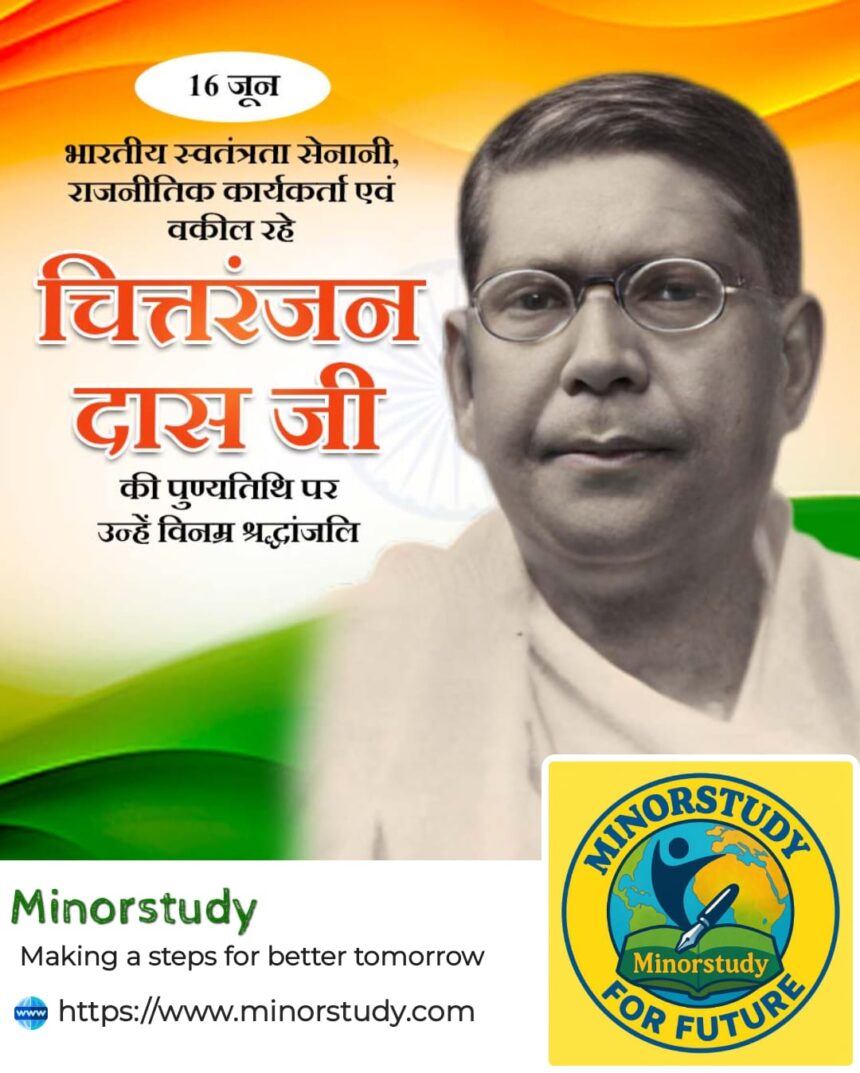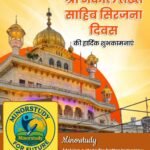🧭 Introduction: Remembering the Voice of the Voiceless
In the grand tapestry of India’s freedom struggle, Chittaranjan Das Ji, fondly remembered as Deshbandhu (Friend of the Nation), stands tall as a lawyer, political leader, poet, and nationalist, who fought not only with words but with deep convictions for India’s independence. His life was a harmonious blend of intellect, passion, and sacrifice, inspiring generations to uphold liberty, unity, and civil rights.
- 🧭 Introduction: Remembering the Voice of the Voiceless
- 🕰️ Historical Background: The Making of a Deshbandhu
- 📜 Timeline of Key Life Events
- 🔍 Important Facts About Chittaranjan Das Ji
- ✨ Significance of Chittaranjan Das Ji in Indian History
- 🔹 Legal Defender of Revolutionaries
- 🔹 Founding Father of the Swarajya Party
- 🔹 Unity Builder
- 🔹 Municipal Reformer
- 🔹 Cultural Awakener
- 🎉 Observance and Tributes
- 🙏 Heartfelt Wishing on Chittaranjan Das Jayanti or Punyatithi
- 📌 Why Chittaranjan Das Ji Matters in Our Lives Today
- ✅ Voice for Justice
- ✅ Political Foresight
- ✅ Civic Responsibility
- ✅ Literature and Patriotism
- ✅ Model of Inclusive Leadership
- ❓ Frequently Asked Questions (FAQs)
- Q1. Why is Chittaranjan Das called Deshbandhu?
- Q2. What was Chittaranjan Das’s role in the Alipore Bomb Case?
- Q3. What was the Swarajya Party and why was it important?
- Q4. Did Chittaranjan Das support Gandhi’s non-cooperation movement?
- Q5. Where is Chittaranjan Das buried?
- 🔑 Important Points to Remember
- 🧠 Conclusion: A True Patriot, A Timeless Inspiration
- 🌍 Daily Life and Societal Impact
- 🎯 Final Thought
Today, remembering him is not just a nostalgic act—it’s a call to revive fearless leadership in our modern age.
🕰️ Historical Background: The Making of a Deshbandhu
Full Name: Chittaranjan Das
Popularly Known As: Deshbandhu (Friend of the Nation)
Born: 5 November 1870, Calcutta (now Kolkata), Bengal Presidency, British India
Died: 16 June 1925, Darjeeling, British India
Profession: Lawyer, Politician, Freedom Fighter, Poet
Chittaranjan Das came from a well-educated and aristocratic family. His father, Bhuban Mohan Das, was a solicitor and a journalist, while his uncle, Durga Mohan Das, was a well-known Brahmo Samaj reformer.
Das studied in England and became a barrister in 1892. He returned to India with a clear vision: to use his legal expertise and eloquent voice for the cause of India’s freedom.
📜 Timeline of Key Life Events
| Year | Event |
|---|---|
| 1870 | Born in Kolkata. |
| 1892 | Became a barrister in England. |
| 1909 | Published nationalist poem “Malancha”. |
| 1917 | Joined the Indian National Congress. |
| 1921 | Defended Aurobindo Ghosh in Alipore Bomb Case successfully. |
| 1922 | Became the first elected Mayor of Calcutta Corporation. |
| 1923 | Founded the Swarajya Party with Motilal Nehru. |
| 1925 | Passed away in Darjeeling at age 55. |
🔍 Important Facts About Chittaranjan Das Ji
Gave up his legal career to join the Non-Cooperation Movement.
Defended Sri Aurobindo in the Alipore Bomb Case (1908–09) and won, gaining national prominence.
Was a devoted follower of Mahatma Gandhi, but later advocated for constructive opposition within the system, forming the Swarajya Party.
Supported Hindu-Muslim unity and appointed Muslim leaders to high civic posts when he became Calcutta’s Mayor.
As a poet and writer, he used literature as a tool of national awakening.
Practiced austerity and simplicity—gave up Western clothing and wore khadi.
His death triggered national mourning; even British leaders praised his intellect and charisma.
He envisioned social justice, self-rule, and education reforms.
Tagore admired his writings and efforts for India.
His daughter, Chittaranjani Devi, continued his legacy through social service.
✨ Significance of Chittaranjan Das Ji in Indian History
🔹 Legal Defender of Revolutionaries
Das Ji was one of the first prominent legal minds to stand for revolutionaries in British courts, risking his career and life for the cause.
🔹 Founding Father of the Swarajya Party
He envisioned participating in British-made councils not to support colonial rule, but to disrupt and expose it from within, co-founding the Swarajya Party in 1923 with Motilal Nehru.
🔹 Unity Builder
At a time of growing communal rifts, he worked hard for Hindu-Muslim unity, often criticized by both sides for his inclusive leadership.
🔹 Municipal Reformer
As the Mayor of Calcutta, he brought in reforms for sanitation, education, and civil services—laying the groundwork for modern civic governance.
🔹 Cultural Awakener
As a poet and author, he wrote nationalistic poems that inspired patriotic fervor among the youth.
🎉 Observance and Tributes
While Chittaranjan Das Ji’s birthday (5 November) and death anniversary (16 June) are not national holidays, they are widely commemorated in Bengal and by scholars, political leaders, and social groups:
Schools and universities hold debates and essay competitions.
His memorial at Darjeeling and statues across India are garlanded.
Tributes are paid in the Parliament and local bodies.
Newspapers and magazines recall his contributions.
Special editions of his writings and speeches are published.
🙏 Heartfelt Wishing on Chittaranjan Das Jayanti or Punyatithi
“On this day, we salute Deshbandhu Chittaranjan Das Ji, the fearless patriot, the eloquent voice of justice, and the tireless servant of India. May his courage and vision continue to guide us in building a just and free society.”
Wishing you strength, vision, and unity on Chittaranjan Das Punyatithi. Jai Hind!
📌 Why Chittaranjan Das Ji Matters in Our Lives Today
✅ Voice for Justice
He reminds us to speak truth to power, even when it is inconvenient or dangerous.
✅ Political Foresight
His founding of Swarajya Party shows how healthy opposition and democratic accountability were key to building India’s future.
✅ Civic Responsibility
As Mayor, his actions promote the idea that real leadership begins at the grassroots, not just in parliaments.
✅ Literature and Patriotism
His poetic writings reveal how literature can be a weapon of revolution.
✅ Model of Inclusive Leadership
In an age of division, his life offers an example of religious tolerance and unity.
❓ Frequently Asked Questions (FAQs)
Q1. Why is Chittaranjan Das called Deshbandhu?
Ans: He was given the title Deshbandhu (Friend of the Nation) for his unwavering dedication to India’s freedom and his selfless service to the people.
Q2. What was Chittaranjan Das’s role in the Alipore Bomb Case?
Ans: He served as the defense lawyer for Sri Aurobindo, and through his brilliant arguments, helped acquit Aurobindo of all charges.
Q3. What was the Swarajya Party and why was it important?
Ans: Formed in 1923 by Das and Motilal Nehru, the Swarajya Party aimed to enter legislative councils to obstruct and expose colonial policies from within.
Q4. Did Chittaranjan Das support Gandhi’s non-cooperation movement?
Ans: Yes, initially. However, later he believed that active legislative resistance was also necessary alongside non-cooperation.
Q5. Where is Chittaranjan Das buried?
Ans: His Samadhi is in Darjeeling, West Bengal, where he died in 1925.
🔑 Important Points to Remember
He gave up a lucrative legal career for India’s independence.
Called Deshbandhu for his people-first approach.
An icon of civic leadership, cultural patriotism, and legal brilliance.
Believed in dialogue, constitutional rights, and social reform.
Balanced Gandhian ideals with political activism inside the system.
🧠 Conclusion: A True Patriot, A Timeless Inspiration
Chittaranjan Das Ji was much more than a political figure—he was a conscience of colonial India, a humanitarian, reformer, and cultural renaissance figure. In a time when we need leaders who can rise above narrow self-interest and short-term politics, Deshbandhu’s life offers a beacon.
His philosophy teaches us that freedom is not just about political independence, but about social justice, civic engagement, and unity in diversity.
🌍 Daily Life and Societal Impact
Legal and civic activists still quote his arguments in constitutional cases.
His model of grassroots leadership is taught in public administration.
Writers and poets take inspiration from his nationalistic literature.
He paved the way for multi-religious, inclusive political engagement.
🎯 Final Thought
“When leadership means sacrifice, when law becomes a sword for justice, when poetry awakens nations—you get a Deshbandhu Chittaranjan Das.”








